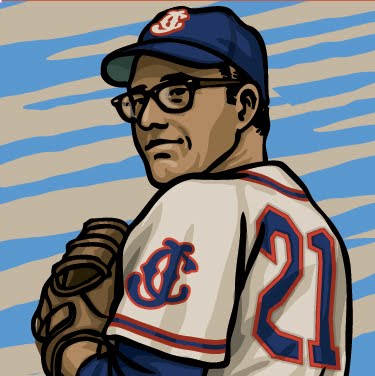
Like millions of people around the globe, I tuned in to watch the opening ceremonies of this year's Olympic Games in London. A few hours later I found myself trying to make sense of what the crippled kids, scarey demon monkees and high school theater club "dancing-through-time" skit had to do with the world's greatest sporting event. I longed for the time when the opening ceremony meant each team marching around the track carrying the flag of their nation, followed by some speeches by local dignitaries and then the games would begin. The newspaper reporting of the games and participants was centered not like today on an athlete's tragic family history, but on their athletic prowess, vitality and determination to win for their country. In tribute to those more sports-oriented games, I bring to you Abel Kiviat, American silver medalist and a member of the first Olympic baseball team.
Although baseball had been popular in Latin America and Japan since the 1880’s, the game just hadn’t caught on with young men in other countries. The game was seen as too complicated and unrefined especially to Europeans but because of the way immigrants from these same countries embraced and excelled at the sport once arriving in America, the game was given a chance at becoming an official Olympic event. At the 1912 Games in Stockholm a series of two exhibition games were scheduled to gauge spectator interest in the sport. The first game was against a team made up of local Swedish players, the game having become recently introduced to that country courtesy of immigrants returning home from America. The American team was selected from athletes already competing in officially sanctioned events. Due to obvious reasons, the United States Olympic Committee forbade any of their athletes from competing in the exhibition baseball games until their own events were finished. A natural selection for the team was Jim Thorpe who seemed to excel at just about any sport invented, but he had to miss the first game because he was in the process of winning a gold in the decathlon. However Thorpe’s roommate played that day.
By the age of 20 Abel Kiviat was one of the best middle-distance runners in the world. He was a star athlete at his high school on Staten Island, holding the New York City record for the half-mile and mile race as well as being recognized as an All-Star shortstop in baseball. After high school he raced competitively for the Irish-American Athletic Club, one of the best sporting clubs in the States. While representing the Club he set 3 outdoor and 6 indoor records and won an additional nine national titles. Although a Jew and not of Irish heritage he was selected to be the teams captain for five years. While qualifying for the 1912 United States Olympic Team, Kiviat set the world record for the 1500 meter race with a time of 3 minutes 55.8 seconds which remained unbroken until 1917. Although the favorite going into the 1912 Olympics, he managed to win only the silver when he inadvertently eased up towards the end of his race and lost to England’s Arnold Jackson. Kiviat was, however, the American baseball team’s biggest slugger.
In the first game against the local Swedes, Kiviat went 2 for 4 with a triple and stole two bases as the Americans won 13-3 in a game lasting 6 innings. The sparsely attended game mostly attracted Americans and Swedish-Americans who were already familiar with the sport. The game played on the following day attracted a much larger crowd, probably due to the fact that the regular events were winding down and that Jim Thorpe, the sensation of that year’s games was scheduled to play.
The teams were made up solely from American athletes with Thorpe making an appearance in right field on the same squad as his roommate, Kiviat. With the competition much stiffer and being a little rusty since his days as an All-Star high school shortstop, Abel committed 2 errors in the game but more than made up for it at the plate, going 2 for 3 with a double and stolen base. Kiviat’s team won 6-3.
Baseball didn’t make that big of an impression on the Olympic Committee and would not be tried again until 24 years later at the Berlin Games. Abel Kiviat returned to America and continued to run races but his career was cut short when he was suspended by the Amateur Athletic Union in 1915 when he was accused of asking for too much money for expenses in order to travel to a track meet in Upstate New York. Athletes were supposed to maintain their eligibility by not receiving outright payment for their talent but some got around this by accepting large payments under the category of “travel expenses.” Kiviat fought the charges and was reinstated 8 years later but by then he was a long way from his former peak. He stayed active in the sport he loved by volunteering at the big annual track meets held at Madison Square Garden where he became a gregarious fixture in the press box. In 1984, at the age of 91, Kiviat was given the honor of participating in the Olympic torch relay through Manhattan. He lived to the ripe old age of 99, for a time America’s oldest living Olympian.
This story was included in the Premier Issue of "21: The Illustrated Journal of Outsider Baseball" which highlights the careers of 14 Jewish ballplayers and can be purchased by clicking HERE or on the tab right below the arrow on the main header of this blog.



nice share thanks
ReplyDeleteharga emas 24 karat bandung hari ini
harga emas 24 karat bandung hari ini
Nice share thanks for posting
ReplyDelete